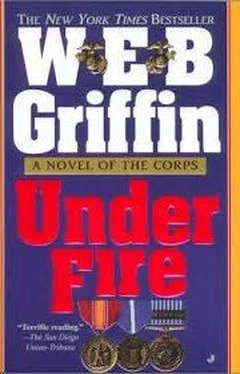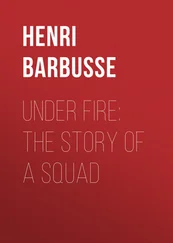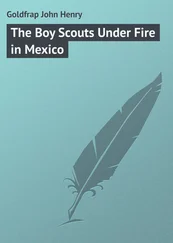Griffin W.E.B. - The Corps 09 - Under Fire
Здесь есть возможность читать онлайн «Griffin W.E.B. - The Corps 09 - Under Fire» весь текст электронной книги совершенно бесплатно (целиком полную версию без сокращений). В некоторых случаях можно слушать аудио, скачать через торрент в формате fb2 и присутствует краткое содержание. Год выпуска: 0101, Жанр: Старинная литература, на английском языке. Описание произведения, (предисловие) а так же отзывы посетителей доступны на портале библиотеки ЛибКат.
- Название:The Corps 09 - Under Fire
- Автор:
- Жанр:
- Год:0101
- ISBN:нет данных
- Рейтинг книги:5 / 5. Голосов: 1
-
Избранное:Добавить в избранное
- Отзывы:
-
Ваша оценка:
- 100
- 1
- 2
- 3
- 4
- 5
The Corps 09 - Under Fire: краткое содержание, описание и аннотация
Предлагаем к чтению аннотацию, описание, краткое содержание или предисловие (зависит от того, что написал сам автор книги «The Corps 09 - Under Fire»). Если вы не нашли необходимую информацию о книге — напишите в комментариях, мы постараемся отыскать её.
The Corps 09 - Under Fire — читать онлайн бесплатно полную книгу (весь текст) целиком
Ниже представлен текст книги, разбитый по страницам. Система сохранения места последней прочитанной страницы, позволяет с удобством читать онлайн бесплатно книгу «The Corps 09 - Under Fire», без необходимости каждый раз заново искать на чём Вы остановились. Поставьте закладку, и сможете в любой момент перейти на страницу, на которой закончили чтение.
Интервал:
Закладка:
"I see," General Taylor said. "Isn't that a little unusual, General?"
"These are unusual times, Taylor, and Pickering is an unusual man."
"I'm sure you gave the matter thought, General," Taylor said.
"Actually, it didn't require much thought," Dawkins said. "The question was the best way to do it. I have to run, Taylor. Let's see if we can find time to have lunch."
The line went dead.
Taylor put the telephone in its cradle and looked at O'Halloran.
"General Dawkins," he reported evenly, "has arranged for Major Pickering and Captain James to enter upon ac-tive duty on the arrival of VMF-243 in the Far East, or on 21 August, whichever occurs first."
"Yes, sir."
"In these circumstances, I suggest that we call him back in here and so inform him. Wouldn't you agree?"
"Yes, sir."
"Tell me, Colonel, is that the way things are normally done in Marine aviation?"
"Well, sometimes, sir, we bend the regulations a little to get the job done."
"So I am learning," General Taylor said.
[THREE]
THE SUPREME COMMANDER'S CONFERENCE ROOM
HEADQUARTERS, SUPREME COMMANDER, ALLIED
POWERS
THE DAI-ICHI BUILDING
TOKYO, JAPAN
1035 25 JULY 1950
The briefer, a natty, crew-cutted major, turned from the map on which he had just located the positions of the North Korean forces advancing on Pusan, came almost to attention with his pointer held along his trouser leg, and, addressing Major General Charles A. Willoughby, who sat at the end of the table closest to the maps, said, "That's all I have, sir."
"Do you have any questions, sir?" Willoughby asked.
General of the Army Douglas MacArthur, the Supreme Commander, who was sitting at the far end of the long, highly polished table, took a long pull at a thin black cigar and after a moment, shook his head, "no."
"Anyone else?" Willoughby asked. He looked at Major General Edward M. Almond, the SCAP chief of staff who was at the left side of the table next to MacArthur. "Gen-eral Almond?"
Almond shook his head, "no."
"General Stratemeyer?"
Lieutenant General George E. Stratemeyer, the senior Air Force officer on the SCAP staff, who was sitting next to Almond, shook his head, "no."
"Admiral Joy?"
Rear Admiral C. Turner Joy, the senior Naval officer on the SCAP staff, who was sitting across the table from Willoughby's own empty chair, shook his head, "no."
"General Whitney?"
Major General Courtney Whitney, the SCAP G-3, who was sitting next to Stratemeyer, shook his head, "no."
Willoughby looked at Brigadier General Fleming Pick-ering, who was sitting next to Stratemeyer and across from Almond.
"Thank you, Major," Willoughby said. "That will be all." Then he added, "Leave the map," and took his seat.
"Yes, sir," the major said, and walked out of the room.
General Almond got to his feet and walked to the end of the table, so that he was standing in front of the map.
"Sir?" he asked MacArthur.
"General Pickering," MacArthur asked, "have you any-thing to add?"
Brigadier General Fleming Pickering rose.
"No, sir," he said.
Was that simply courtesy on El Supremo's part? Or was he letting Willoughby know he shouldn't ignore me?
"Then I believe our business is concluded," MacArthur intoned, getting to his feet. "Thank you, gentlemen."
The dozen officers at the table, all general or flag offi-cers, rose to their feet as MacArthur walked to the door that led to his office and passed through it.
General Almond pushed the map back into its storage space.
The other senior officers began to stuff the documents they had brought to the briefing back into their briefcases.
Almond sensed Pickering's eyes on him and walked to him.
"You look as if you have something on your mind, Gen-eral," he said.
Pickering met Almond's eyes.
"I didn't think the briefing was the place to bring this up..."
"But?" Almond asked.
"I had people on the wharf in Pusan yesterday when the 29th Infantry debarked from Okinawa," Pickering said. "They told me the regiment has only two battalions..."
"Peacetime TO and E," Almond said. "You told me the 1st Marine Division's regiments were similarly under-strength."
"Yes, sir," Pickering said. "General, my people..."
"You're speaking of... your aide-de-camp?" Almond asked, a slight smile on his face.
Pickering nodded. "Yes, I am."
Almond had been present at a luncheon meeting when MacArthur had announced that Pickering was going to have to do something about an aide-de-camp.
"I have one, sir," Pickering said. "Captain McCoy."
That had not been the truth, the whole truth, and nothing but the truth. Pickering did not have an aide-de-camp. He didn't think he needed one. But he knew MacArthur well enough to know that if MacArthur thought he needed an aide-de-camp, and there was no suitable young Marine of-ficer available, he would give him a suitable young Army officer "for the presents"
There were a number of things wrong with that, starting with the fact that any bright young officer assigned to SCAP would naturally feel his loyalties lay with SCAP-either the SCAP, MacArthur, or SCAP generally, which would include Almond, the SCAP chief of staff, and Willoughby, the SCAP G-2, rather than solely to Brigadier General Fleming Pickering.
That was understandable. The Supreme Commander was the Supreme Commander. Supreme Commanders were in command of everything, especially including all one-star generals.
And MacArthur and Willoughby-and possibly Al-mond, although Pickering wasn't sure about Almond-had done a number of things, possibly simply courtesy, to make Pickering seem like, feel like, a member of the SCAP staff.
He had been given an Army staff car (a Buick, normally reserved for major generals or better, rather than a Ford or Chevrolet) and a driver, for one thing. He had been given an office, staffed by a master sergeant and two other en-listed men, in the Dai Ichi Building, "on the SCAP's floor."
A seat had been reserved for him at the daily briefings/staff conference. He had been offered quarters, in sort of a compound set aside for senior officers, and two or-derlies to staff it.
This would have been very nice if Pickering had been assigned to the SCAP staff, but that wasn't the case. Offi-cially, he was the Assistant Director of the Central Intelli-gence Agency for Asia. The CIA was not under MacArthur's command, although the CIA station chief in Tokyo was under mandate to "coordinate with SCAP."
More than that, Pickering was under orders from the President of the United States to report directly to him his assessment of all things in the Far East, including General of the Army Douglas MacArthur.
Pickering had quickly learned that the CIA Tokyo sta-tion chief (whose cover was senior economic advisor to SCAP) had quarters in the VIP compound, a staff car, and considered himself a member of the SCAP staff.
If he could have, Pickering would have relieved the sta-tion chief on the spot for permitting himself to be sucked into the MacArthur magnetic field. The CIA was not sup-posed to be subordinate to the local military commander or his staff. But he realized that would have been counterpro-ductive. For one thing, it would have waved a red flag in MacArthur's face. For another, he didn't know who he could get to replace him.
Pickering had declined the VIP quarters, saying that he was more comfortable in the Imperial Hotel. When Willoughby heard about that, he replaced the driver of Pickering's staff car with an agent of the Counterintelligence Corps wearing a sergeant's uniform, and assigned other CIC agents, in civilian clothing, to provide around-the-clock security for Pickering in the Imperial Hotel.
Willoughby's rationale for that was that the Assistant Director of the CIA for Asia obviously needed to be pro-tected. That was possibly true, but it also meant that CIC agents, who reported to Willoughby, had Pickering under observation around the clock.
Читать дальшеИнтервал:
Закладка:
Похожие книги на «The Corps 09 - Under Fire»
Представляем Вашему вниманию похожие книги на «The Corps 09 - Under Fire» списком для выбора. Мы отобрали схожую по названию и смыслу литературу в надежде предоставить читателям больше вариантов отыскать новые, интересные, ещё непрочитанные произведения.
Обсуждение, отзывы о книге «The Corps 09 - Under Fire» и просто собственные мнения читателей. Оставьте ваши комментарии, напишите, что Вы думаете о произведении, его смысле или главных героях. Укажите что конкретно понравилось, а что нет, и почему Вы так считаете.










